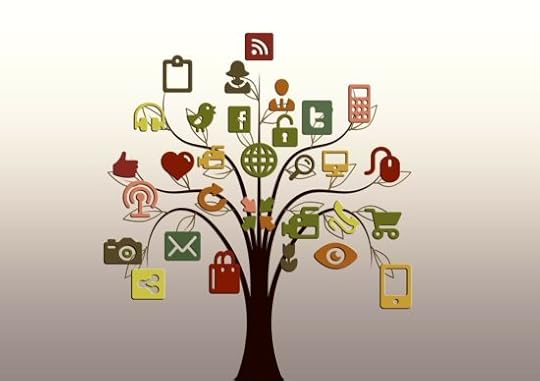Byron Sogie-Thomas's Blog
June 13, 2017
Just Do It!

Everyone has goals, but not everyone pursues them. Most people lack motivation or are just so caught up in their daily lives that they forget to pursue what they’re most passionate about. Pursuing goals is hard work. If you find yourself overwhelmed by everyday life and unable to pursue your passion, follow these some steps that will help move you toward your goals.
Visualize. Visualizations are very powerful because our minds react strongly to imagery. According to several studies, imagining a scenario or activity activates the same areas of the brain involved in the actual physical performance of the activity. These brain activities were studied while using an electroencephalogram (EEG), which records electrical activity in the brain.
Physical visual boards are also helpful. Crafting is a plus because you get to exercise your creative juices. But if you’re not into the actual cutting and collaging process, you can create virtual visual boards in websites like Pinterest, We Heart It, and Tumblr.
Tell your friends. This way someone other than yourself can hold you accountable for your actions. Your friends are the most perfect reminders you’ll have. Their support and encouragement are also essential in your success.
Break it into small steps. Some people quit their goals because they get scared of the enormity of those goals. So create a step-by-step game plan. As Antoine de Saint-Exupéry said, “A goal without a plan is just a wish.” List all the steps that would get you to your goal. Make each step specific, realistic, and most importantly, doable.
Set a schedule and a deadline.Dreaded as they are, deadlines are actually very important in reaching your goals on time. Deadlines can be used as a prioritization tool. A compass that will guide on what to do first, and a reminder on which particular steps you should be focusing on at a certain time.
However, it is important to note that you should be setting deadlines that are realistic. Too much optimism may lead you to commit a planning fallacy, a phenomenon wherein a person underestimates the time needed to complete a task.
It is also important to note future obstacles you will be facing while setting your deadline. Allow a certain time so you could be able to adjust errors. Also remember to prepare a contingency plan.
Practice self-discipline. None of these things will work if you don’t have self-discipline. You could be stuck in a sea of procrastination or perfectionism and end up squandering your brilliant ideas.
Waiting for everything to “feel just right” or waiting for that “bolt of inspiration” will get you nowhere. Self-discipline is important because it lets you acknowledge feelings of discomfort and fear, while reminding you that you can push through.
One way of establishing self-discipline is through the creation of habits. It only takes 21 days to form a habit. Habits are powerful because after your brain has created the right neural connections, the habit becomes a process of your basal ganglia instead of your prefrontal cortex. The basal ganglia is the part of the brain that keeps hold of your memories and patterns. It means your own brain can autopilot into doing whatever task it is that you need to complete your goal, lessening the time that you allot for contemplation and decision making before starting a certain task.
Did you love what you read? Reach me through my twitter account @ByronSThomas and Facebook page www.facebook.com/ByronSThomas.
The post Just Do It! appeared first on Byron Sogie-Thomas.
June 6, 2017
Finding Your Voice

We live in the age of technology where trends and fads change in the blink of an eye. With the rise of social media sites like Snapchat, Facebook, and Instagram, we become more conscious of the self that we project online. Sometimes it even extends its power in the things that we do offline. We do activities that are “blog worthy,” go to places and eat food that are “Instagrammable.”
We become more vulnerable in being swayed in following the herd. We are pressured to conform to the latest trends, purchase the newest technology upgrades, visit up-to-the-minute destinations, to buy the most fashionable must-haves—that sometimes it makes us forget about ourselves. We overlook our own preferences, own style, even forget our own voice.
How do we avoid being drowned out by the voices of the maddening crowd? Here are some questions we should ask ourselves to help us clearly hear our inner voice.
What makes you tick? What are your pet peeves? What makes you genuinely happy? What eases you after a stressful day at work? What helps you destress? What provokes a compassionate anger in you? What makes you hope? What are you most passionate about? What motivates you to get up in the morning? Which activities, people, or things give you purpose? List down the things that anger you the most, and ask yourself why. This will make your inner voice clearer.
Transform the ongoing conversation in the stream of your consciousness into words. Knowing what you want and your stand on things will guide you in asserting your own thoughts to the world.
Spending time in the quiet helps. Allotting “alone time” for at least fifteen minutes a day helps our brains declutter. It is important that we find a safe space where we can be alone and vulnerable, then we can start practicing how to be calm. Because it is when we are calm that the connection to our inner wisdom is the strongest.
Breathing exercises also help. It’s okay to not call it meditation because sometimes it intimidates others who are not familiar with the practice. Just feel your breath. Listen to your body and your gut; it will help you figure out your feelings about certain issues and situations. Discomfort in choices or decisions, for example, can manifest in nausea, sleeplessness, or physical agitation.
Honing your instincts is also important. We should put our inner voice to a test so we can be more exact in listening to and acting upon what it tells us. Experimenting and challenging our inner voices can also help us break our own unconscious biases, which will help us become wise.
We all must actively search for our inner voice because, just like a muscle, the more practice and exercise we devote ourselves into, the easier it is for us to channel it when we need it.
What other techniques do you practice in honing your own inner voice? It would be interesting to hear your thoughts in the comment box below. Or send me a tweet at @ByronSThomas to discuss this.
The post Finding Your Voice appeared first on Byron Sogie-Thomas.
May 29, 2017
Public Squares in Modern Times

The internet is the new frontier—a new Wild West, if you will—and it is full of people wanting to carve out a space of their own in the vastness of cyberspace. This World Wide Web is indeed worldwide; people are free to do what they want, with consequences just recently catching up to crimes committed. Businesses thrive, marketing becomes bigger, and nestled somewhere in the midst of it all is the thing that drives people in droves to go online—social media. There was MySpace. We have Twitter and the behemoth called Facebook. There are forums like Tumblr and Reddit, to name a few. The internet has become a space for people to share their thoughts at a moment’s notice, more often than not, in 140 characters or less. People can share links, articles, blogs, news reports, photos, videos, and all manner of things that can be uploaded, and likewise, people click on the Like button and make comments about anything and everything under the sun.
If there is a question, people can just go on Google to search or on Wikipedia to learn more. People can communicate through different email services and on instant-messaging accounts like Facebook Messenger, Viber, and Whatsapp, to name a few. Even China and South Korea have their own versions of a search engine, and no wonder, as communicating online is faster than any form of communication possible.
But can social media be considered magic, or is it a monster? There are so many pros and cons. On one hand, social media links the world together. Someone from Madagascar can post an opinion in the public sphere, and people from India, Malaysia, Uganda, and France can comment on it. However, that in itself is another problem. People can post anything without regulation or even thought for the repercussions. Someone from the United States can type on his Facebook status page something insulting about another country and its people, which can lead into a huge online fight that fans the flames of racism and discrimination. Going back to the Wild West analogy, this is when someone shoots a gun indiscriminately and hits someone who can shoot back. It is an imaginary public square with people just letting themselves type their thoughts without fear of physical retribution. Some kids have bullied other teens into ending their lives, but at the same time, many people on other platforms have saved lives by creating campaigns on Kickstarter or even messages of encouragement to others far away.
Social media and the internet are very recent additions to the social lives of human beings. It’s very interesting to see how these interactions turn out, but for now we can only watch and see how this technology unfolds and if they can improve humanity or not in the long run.
It’s very interesting to discuss these things, so feel free to write your comments below and tell me what you think of social media and the internet. You can also sent me a tweet @ByronSThomas.
The post Public Squares in Modern Times appeared first on Byron Sogie-Thomas.
May 22, 2017
A Heritage of Faith

The church is not a building. It is a family of brothers and sisters who grow together in serving God. What keeps them together? It is faith that comes from the great love of God. Faith is the binding presence that keeps the church alive.
Today, more than two billion people build connections through the social media. As of 2017, Facebook continues to be the major platform for building online connections worldwide. This proves that, human as we are, we desire the company of our fellowmen, and social media is the fastest way to find the right people whom we can associate with.
In my case, I have been privileged to build stronger connections when I was introduced to a group of people in church. I was raised in strong faith, and I grew in love and constant encouragement to do what is good and right in the eyes of God.
The church is the people whom God has sent to make sure that we are properly guided in our spiritual journey. It is more than just the worship and tithe-giving community. More importantly, it is more than just the smiling faces that we see every time we meet them in our prayer meetings and Bible studies.
In every stage of our lives—childhood, youth, adulthood—the church is first and foremost our spiritual companion in our journey with God. Because the spiritual development doesn’t stop, we are encouraged to be more and more vigilant in participating in church activities as we grow older.

The unique and probably the most important aspect of being in a spiritual community is that we have someone who constantly intercedes for us. Having prayer support doesn’t mean that nothing can go wrong in our life, but it means that everything will work out in the end, no matter how difficult life can be.
Having a spiritual community allows us to be nourished with spiritual food by the exchange of knowledge from one another’s experiences. The good thing about growing up in church is that we get to learn from the struggles and triumphs of our church members. You get to share yours too, and they still accept you, your flaws and all.

The older we get, the more that we should be encouraged to seek God through our church. Keeping the habit when we enter adulthood helps us in more ways than we can ever imagine. We notice belongingness is a pressing need as bigger and more complex problems arise. The desire to have the spiritual support of the church becomes our utmost priority as we grow older in our journey with God.
Growing up in church and keeping the habit into adulthood keeps us humble. We meet people whose life stories inspire us to have a deeper relationship with God. We are constantly reminded that man cannot live without God and without companions. In the eternal words of John Donne, “No man is an island.” Having a community means you have a family outside your family. It is always a privilege to have a community that supports and nurtures your faith and love for God.
Does your church help you keep your faith in God alive?
References:
Kemp, Simon. 2017. “Digital in 2017: Global Overview.” We Are Social. Accessed May 12, 2017. https://wearesocial.com/blog/2017/01/digital-in-2017-global-overview.
Chaffey, Dave. 2017. “Global Social Media Research Summary 2017.” Smart Insights. Accessed May 12, 2017. http://www.smartinsights.com/social-media-marketing/social-media-strategy/new-global-social-media-research/.
The post A Heritage of Faith appeared first on Byron Sogie-Thomas.
May 15, 2017
Learning from Someone Else’s Mistakes

We all make mistakes, ranging from small ones (like spilling coffee on our document) to big ones, which may greatly affect the lives of others. Ideally, mistakes should be made only once. But an essential thing to do is to avoid making that mistake. Is it possible? Yes, it is! All you have to do is learn from other people’s mistakes!
Learning the easy way or learning from what you observe in your surroundings is a lot more beneficial for you than making the mistake yourself. You are spared from the pain of doing it all wrong, and the regret that you did not value what your parents and others’ experiences taught you.
Take for example the rising cases of injury and horrifying deaths of people who take selfies in dangerous locations in the hopes of getting a lot of followers. To stop these incidents from ever happening again, the public is warned not to give the thought a try the next time they want to take selfies. Hopefully, this will lessen and ultimately reduce to zero the numbers of casualties of vanity.
You don’t want to make headlines in newspapers by dying while taking a selfie. Unless you are already a pro at extreme activities and it is legal, there are myriads of options out there where you can be famous and successful without giving up your safety.
As one classic proverb says, “Prevention is better than cure.” The wisest thing you can do is to learn from the mistakes of others by recognizing what they did wrong, and making sure you don’t share the same fate.
Let me tell you a story popularized online about two brothers who grew up together, raised by an alcoholic father. One became a drunkard himself while the other grew up to become a successful person. How did this happen when the two lived under the same roof?

The one who followed his father’s footsteps never learned from his father’s mistakes. He went on living the same way, and he ended up the same way as his father: miserable and drunk.
Fortunately, the other brother knew where to look and what to avoid. He used his father’s mistake to his advantage. Where is he now? He is happily enjoying the life that his father and brother failed to experience.
The Bible does not fall short in giving us precious stories that we can learn a lot from. For example, the famous victory of David over Goliath teaches us to be always humble and to never judge the capabilities of others just by their outward appearance. Also, the story of Samson and Delilah makes us realize that following the Lord’s plan for us and being committed to our mission is the best way to fully reap God’s rewards.
I hope you can be the brother who chose to live according to what God wants him to do. Learn from others’ mistakes, and you will never go wrong in your life.
Reference
Mohn, Tanya. 2017. “Death By Selfie: Serious Incidents, Including Injury And Death, Are On The Rise.” Forbes, January 31, 2017. Accessed May 5, 2017. https://www.forbes.com/sites/tanyamohn/2017/01/31/death-by-selfie-serious-incidents-including-injury-and-death-are-on-the-rise/#210fd4538377.
The post Learning from Someone Else’s Mistakes appeared first on Byron Sogie-Thomas.
May 2, 2017
Life of a Salesman: Meeting Different People Can Teach You about Life
Human interaction can shape us as people. There is so much we can learn from our fellow humans, from shared experiences to different perspectives that help us make more sense about life and existence. This belief is sharpened by my dealings with all sorts of people as I try to sell them stuff. I learned about human nature as a salesman.
How many times have we heard the phrase, “The customer is always right”? This nugget of wisdom can guide a salesman through tricky situations. You are the one doing the adjustment. As a salesman, you are not only selling. You are also persuading and influencing. You accommodate every person from all walks of life. You assist them in making a choice and try to make every decision a win-win situation for all parties involved. You have the responsibility to keep the clients happy. The tone of your voice, your willingness to lend your ears, and your ability to communicate can make a big difference. It will also let you see through the human psyche.
Some people are amiable. They are the patient type. They let you give your sales pitch. They listen, absorb, and accept or decline. They nod in understanding or sympathy. They are the ones who show you respect, enough to open their doors even though you interrupted them at an inconvenient time. They will say hello and bid you goodbye. They are a salesman’s dream.
Some are self-absorbed. If you catch them at a bad time, they will turn you away at the door. Sometimes, they won’t even bother answering at all. And where does that leave the salesman? Try your luck next door, of course.
Some are driven. They want their time’s worth, so they demand answers and solutions, and they want it instantly. Competence is important to them. A salesman should do well by being direct to the point.
Some are hedonistic. They constantly seek the next high. They aim to discover everything the material and sensual world can offer.
Some are trying to wear a mask to hide their vulnerability. If you see past their bravado, you will find a defenseless being who needs understanding more than sympathy.
All humans are different, and yet, inexplicably the same. We are all capable of light and dark. The salesman has to deal with this every day—the good, the bad, the difficult, and the easy. As a salesman, you will learn the pain of rejection. You will know how to deal with being ignored. You will find your courage waning, but you cannot give up because there is another day to gather your strength and begin again.
Being a salesman will teach you about patience, compassion, endurance, and decency. It will impart valuable lessons that will guide you through the uphill battles in the cutthroat world of doing business and in life.

References
Diane Coutu, “Leveraging the Psychology of the Salesperson,” Harvard Business Review, July–August 2006, last accessed April 25, 2017, https://hbr.org/2006/07/leveraging-the-psychology-of-the-salesperson.
Scott Albro, “SALES SKILLS: 18 SKILLS EVERY SALESPERSON SHOULD MASTER,” TOPO Blog (blog), last accessed April 25, 2017, http://blog.topohq.com/sales-skills-18-skills-every-salesperson-master/.
The post Life of a Salesman: Meeting Different People Can Teach You about Life appeared first on Byron Sogie-Thomas.
April 24, 2017
The Beauty of Self-Love

Self-love is tricky. It can evoke feelings of guilt and selfishness. Remorse, even. Contrary to what old clichés would have us believe, however, loving and taking care of yourself is not necessarily a selfish act. Rather, it can be a matter of survival.
It is never wrong to put your happiness on your list of priorities. Sure, there’s nothing like the feeling of fulfillment after helping someone out in need. But here’s the thing: you can’t give what you don’t have. You have to periodically refill the tank.
Every now and again you need to do something for you, something that makes you happy. It can be something as simple as taking a long bubble bath or chilling out at home with your pets. If you want something a little grander, why not go on a vacation to your dream destination? Or maybe you can do small things on a regular basis, and then do something big every so often. Find what works for you.
Another useful practice for self-love is to get rid of all the toxic things (and people) in your life. You should consider doing this periodically—spring cleaning, of a sort. If someone calls you out for prioritizing your self-love, it is probably in your best interest to avoid them. Learn how to say no to things (and to people). Sometimes, being a yes-person does you more harm than good. Remember, serving others is usually a reliable path to fulfillment, and happiness is a common by-product. But learn to listen to yourself. Your body and your mind have finely-developed mechanisms for warning you when you need to take some time for self-love. Tell-tale signs include: activities that you usually enjoy now irritate or annoy you, you’d rather be alone when you would normally want to be social, and things that typically give you energy now drain the life out of you. If you think you have any of these, then it is time to take remedial action.
Another key nugget—identify all the bad habits in your life, and look for good habits with which to replace them.
Practicing self-love takes time. Yes, the unavoidable feeling of guilt always looms, but paying attention to your well-being doesn’t make you a selfish person. Remember, refilling your love and compassion tank means you’ll have more to give. The increased energy and compassion will help you deal with other people a lot better. You’ll suddenly feel refreshed, alive, and more confident—ready to take on anything.

References
McBride, Karyl. 2013. “Is Self-Care Selfish?” Psychology Today, February 10. Accessed February 23, 2017. https://www.psychologytoday.com/blog/the-legacy-distorted-love/201302/is-self-care-selfish.
Wong, Jelly. “It’s Not Selfish to Love Yourself and Take Care of Yourself.” Lifehack. Accessed February 23, 2017. http://www.lifehack.org/articles/lifestyle/its-not-selfish-love-yourself-and-take-care-yourself.html.
Rodriguez, Gillian Rose. 2016. “Self-Care Is Not Selfish, It Is Essential.” The Huffington Post, August 22. Accessed February 23, 2017. http://www.huffingtonpost.com/entry/self-care-is-not-selfish-it-is-essential_us_57bb0794e4b029a9a466e81d.
Stevenson, Cat Li. 2011. “What It Means to Really Take Care of Yourself.” Tiny Buddha, May 3. Accessed February 23, 2017. http://tinybuddha.com/blog/what-it-means-to-really-take-care-of-yourself/.
Martin, Becca. 2016. “In 2017 Do Whatever the Hell Makes You Happy.” Thought Catalog, December 21. Accessed February 23, 2017. http://thoughtcatalog.com/becca-martin/2016/12/in-2017-do-whatever-the-hell-makes-you-happy/.
Gogh, Shan. 2016. “10 Gentle Reminders for Everyone Who Is Too Hard on Themselves.” Thought Catalog, December 26. Accessed February 23, 2017. http://thoughtcatalog.com/shan-gogh/2016/12/10-gentle-reminders-for-everyone-who-is-too-hard-on-themselves/.
Wehner, Brittany. 2017. “The Importance of Practicing Self-Care.” Thought Catalog, February 8. Accessed February 23, 2017. http://thoughtcatalog.com/brittany-wehner/2017/02/the-importance-of-practicing-self-care/.
The post The Beauty of Self-Love appeared first on Byron Sogie-Thomas.
April 17, 2017
The Imperative of Citizenship: Why Voters Matter in a Democracy
A representative democracy doesn’t work unless the people — the voters — participate. If the people abandon that responsibility, or a dictator takes it away from them, then we don’t have much to work with.

In good years (i.e., a year like 2008, when many more American citizens participated than usual, for a variety of reasons) only about 2 out of every 3 eligible voters showed up. In bad years (such as years like 2014, when there was no president on the ballot) that number dwindles to somewhere around 2 out of every 5 eligible voters.
The data indicates that off-year elections tend to attract the most tuned-in voters, who usually favor the way things were (i.e., building for yesterday). The voters who mostly show up in presidential years commonly reflect America’s emerging diversity. Given their relative youth, this cohort should be the most concerned about the future. Bill Clinton used to say that elections are about tomorrow. Indeed. I would add that those most focused on the future should, in theory, be the most plugged-in voters. Alas, that is not necessarily the case.
Which brings us to a clear and present danger — the dichotomy between those who understand what’s at stake and those who don’t. Further — and even more ominously — the public’s ability to make informed decisions about these matters is in grave peril.
Let me expound. A career politician needs to win elections to keep their career on track. From their perspective, enlightened self-interest demands the following posture: elections are way too important to be left up to voters. This means career politicians could, if left to their own devices, find a way to pick their voters before their voters pick them. In other words, they devise strategies to make sure their opponents show up in smaller numbers than their supporters, by a combination of the following: “gerrymander” voting districts, to make sure as many districts as possible contain voters that vote for the preferred party; purge voters in the opposing party from voter rolls; require voter ID then restrict the number of places to obtain such ID; reduce the number of polling places; create long lines that discourage people from voting; et cetera.
Republicans have turned this into an art form better known as voter suppression. The fruit of their labor is now being fully realized, and the electoral prospects for those who would normally not vote for them is increasingly dire. For example — all across the country at county, state, and federal levels, Democrats have lost seats since the 2010 election in places where they had more voters. It is now an “all hands on deck” kind of emergency. Ari Berman’s Give Us the Ballot describes the scope, pedigree, and level of sophistication of this enterprise. See also recent decisions from various circuits of the U.S. Court of Appeals and the phenomenal work of the Brennan Center at New York University’s Law School.
This brings me to my final point. Daniel Patrick Moynihan wisely said, “Every person is entitled their own opinions, but we are not entitled to our own facts.” That used to be true, but we live in an age where facts can be twisted and in an hour wherein some are increasingly willing to brand inconvenient truth or objective facts as fake news. How then are we to have the crucial conversations necessary to form a more perfect union, if each camp inhabits a different universe?
This is the perfect breeding ground for authoritarianism, which requires that the “Supreme Leader” remain the ultimate arbiter of all that is true. Worse, the Supreme Leader prefers to be in complete control of the flow of information, inbound and outbound.
America’s founding fathers devised a constitutional republic to foreclose those dangers and provide warning systems when the republic is in peril. Even with ear plugs, the alarm bells can be heard all the way down the street.
So here’s the bottom line — show up for every election! Quick — go online now, and make sure your voter registration is valid. Find out which election will happen in your county or state this year!
Reference:
Wikipedia. 2017. “United States Presidential Election, 2016.” Last modified January 9. Accessed January 6. https://en.wikipedia.org/wiki/United_States_presidential_election,_2016.
The post The Imperative of Citizenship: Why Voters Matter in a Democracy appeared first on Byron Sogie-Thomas.
April 10, 2017
Letting Love Find You
 We all like to believe that we’re in control of our destinies. But let’s be real here for a moment—we don’t get to hold the remote control of our lives at all times. Heck, we can’t even control how much traffic we’ll experience during our daily commute, much less find love.
We all like to believe that we’re in control of our destinies. But let’s be real here for a moment—we don’t get to hold the remote control of our lives at all times. Heck, we can’t even control how much traffic we’ll experience during our daily commute, much less find love.
If you have read Razor Bumps and Stretch Marks, you may have noticed that love comes up a lot. The reason is self-evident—for many of us mere mortals, destination love is often at the end of a “broken road,” which is why that Rascall Flats song “Bless the Broken Road” became such a hit at weddings (including yours truly’s). Hopefully as you read through all the poems about romance, you hear familiar echoes that help you realize you are not alone.
A couple pieces of advice: first, discover yourself. Who are you, what do you want, and what do you say when you talk to yourself? Your self-concept matters because we tend to attract who we are. I am familiar with the “opposites attract” cliché, but it is not universally true. We are complex human beings, but the more things partners have in common, the stronger the foundation if you’re interested in building a long-term relationship.
Second, define what love looks like for you, and make sure both parties understand it.
Third, learn what it will take to manage conflict.
Beyond that, love requires us to make a whole series of very personal decisions, and each relationship is an adventure best experienced and defined by those in it. Relax—love tends to find us in the most unlikely places, and often while you’re busy being you.
Reference
Agris, Christy Rose. 2016. “You’ll Find Love As Soon As You Stop Searching For It.” Thought Catalog, August 22. Accessed February 27, 2017. http://thoughtcatalog.com/christy-rose-agris/2016/08/youll-find-love-as-soon-as-you-stop-searching-for-it/.
The post Letting Love Find You appeared first on Byron Sogie-Thomas.
April 3, 2017
Alone or Lonely?

The first collection of poems I published was entitled Escape Artist, and the title poem referred to “the wonderland of reflective thought” and “the utopia of the melancholy soul.” An anniversary edition of this compilation is forthcoming. The poem was my attempt to describe that place of retreat and solitude, an occupational hazard for those of us who dabble in the creative arts. A life of the mind requires such a place, although the muse is just as likely to strike at noisy and crowded moments as it is when you deliberately retreat to the place of being alone.
It goes without saying that being alone does not equal being lonely. Let me be clear—my definition of lonely is that hollow experience of wanting companionship and human interaction, but finding none in that moment or in that season. The trick is to prevent the moment from becoming a season. Alas, too many in our human experience extended seasons of loneliness. The older people get, the more likely this becomes. There’s another piece in Escape Artist that expresses some of these sentiments entitled “When the Phone Doesn’t Ring.”
There are steps we can take to reduce our exposure to loneliness, although we can all agree that there is some upside. Most importantly, loneliness can be an excellent vehicle for self-discovery and analysis, a wonderful cocoon within which we can come to terms with who we really are and what we really want. My desire is that my verse can be a source of comfort in those moments and a means of encouraging reflection and celebration of everything we have going for us.
A few other practical tips: try creative pursuits like drawing or sculpting. Write down your thoughts to find your own voice. Go for a long walk somewhere with a nice view, and don’t forget to dream.
Sounds trite, I know, but chances are you’re going to be okay.
Reference
Carter, Sherrie Bourg. 2012. “6 Reason You Should Spend More Time Alone.” Psychology Today, January 31, 2012. Accessed February 16, 2017. https://www.psychologytoday.com/blog/high-octane-women/201201/6-reasons-you-should-spend-more-time-alone.
The post Alone or Lonely? appeared first on Byron Sogie-Thomas.



